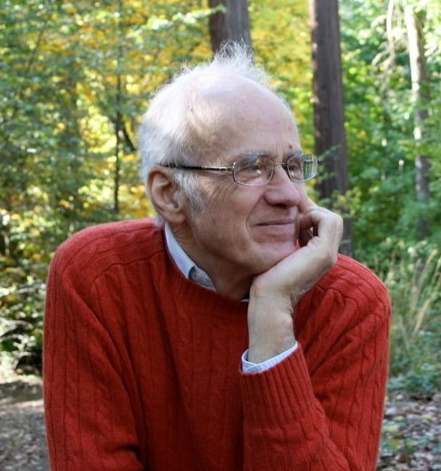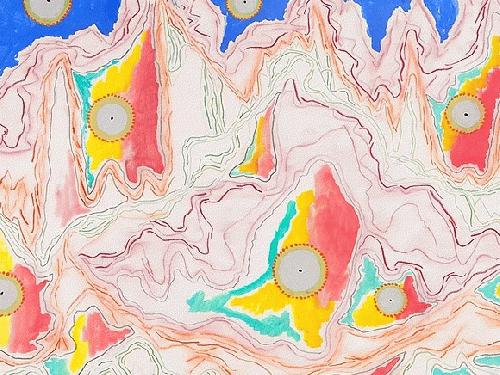First, how do psychedelics work? Because of the rush of imagery during a "trip," one of the early assumptions was that these molecules throw the brain into overdrive. But recent research suggests that they work by shutting down what is called the "default-mode network." This research, done in London, is described in the 2018 book by Michael Pollan, who has been known as a superb food writer, but has now investigated psychedelics.
Though this is not a review of Pollan, whose How to Change Your Mind came out last spring, he merits our thanks in part for giving a compact account of work done by Robin Carhart-Harris of Imperial College, work based on sophisticated imaging techniques. Pollan not only offers a summary of a far-reaching hypothesis about the brain, but also supplies a history of psychedelic research, thoughtful accounts of his own careful experimentation, and a well-informed analysis of our society's attempt to relate intelligently to these mindful molecules, through science done before the "war on drugs" and after the worst of it.
Does science face a severe challenge in investigating the human mind on mindful molecules? Yes, it does. For example, how do you run double-blind research when subjects receiving a placebo, even an "active placebo" such as niacin, know within an hour that they have not been given psilocybin? How does an experimenter deal with an experience often said to be "ineffable"? Nonetheless, despite political hysteria, what Pollan calls the psychedelic renaissance has already yielded useful knowledge.
Pollan interviewed many leaders in the field, from Rick Doblin (founder of the Multidisciplinary Association for Psychedelic Studies), Bob Jesse ("convenor" of the Council on Spiritual Practices*) and his friends Roland Griffiths and Bill Richards, both at Johns Hopkins, to a group of neurologists and others in London. Pollan takes us to the Swiss centennial party for Albert Hofmann, the inventor of LSD. He sees connections between the Carhart-Harris hypothesis and work in a different field, done in the child-psychology lab of Alison Gopnik. His reports of his own trips rank with the best in the capacious and pioneering vaults of Erowid. Further, he had access to publication in both the New Yorker and the New York Times.
((*Disclosure: I should confess to having had the honor of serving on the board of the Council on Spiritual Practices, which this article in no way represents. I have been writing internet articles about classic psychedelics since 2010, and also about "empathogens" such as MDMA, especially about its use as an adjunct to therapy for post-traumatic stress disorder.
Perhaps Pollan's biggest single contribution is to build a bridge for people who have been influenced by the government's scare campaign but who sense the potential of responsible use of psychedelics. I have heard him dismissed as a "square," as ensorcelled by the ideology of "science." But that might be precisely his value, to abjure "new age" cliches and move forward under the rubric of skeptical inquiry. He reports clearly on the use of psilocybin to occasion "mystical-type experience," on neurological research, on his own trips, and on psychotherapy assisted by psychedelics.
But enough about the range of How to Change Your Mind. I want to focus here on a particular service performed by Pollan, which is to present a hypothesis about how a mindful molecule such as psilocybin works, and some implications of this hypothesis about brain structure. The "default-mode network" appears to be evolutionarily late and implicated in the sense of "self," which helps us to survive, but which also imposes a severe and usually hidden limitation.
According to the hypothesis of Carhart-Harris and his colleagues, once the double-negatives are untangled ("entropy-suppression"), part of what psychedelics can do, when taken in a safe place, with the help of an experienced guide, is to occasion an experience of the mind as if one did not have the separate self that we normally take completely for granted.
To the extent his hypothesis is correct, no wonder that a society built on "self-reliant" individuals did not take kindly to a loss of identity. But in Buddhist thought, for example, the self is regarded as problematic, not only to be used but also to be seen through or recognized as non-existent (in the Pali language, anatta). In this view, to be self-reliant is to rely on a useful but limiting illusion.
Half a century ago, when Timothy Leary concocted his famous slogan, "turn on, tune in, drop out," it's not surprising that the society he advised dropping out of was profoundly offended. But perhaps we are dealing not with an either-or but with a both-and, with weaving between incompatible states, both of which are valuable. Perhaps a self is needed for survival and many kinds of achievement; the safe psychedelic occasion, for a kind of wisdom. Psychedelic work relentlessly raises the question: How does the tracery of the world appear when one is not enclosed in an automatic, colorful, utterly normal, hard-to-elude self?






